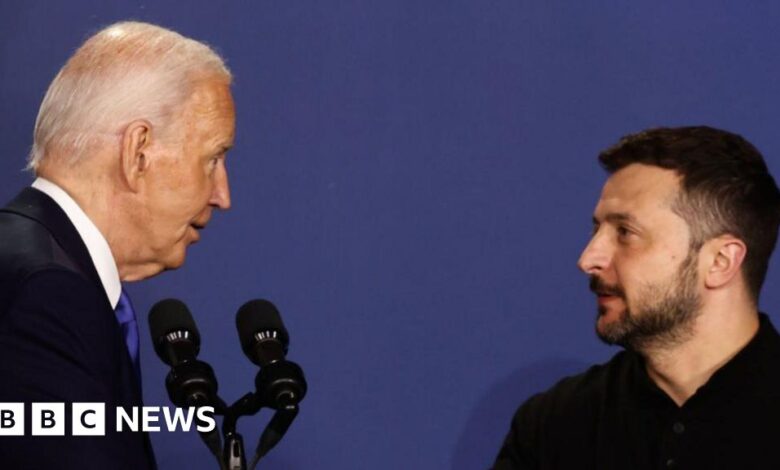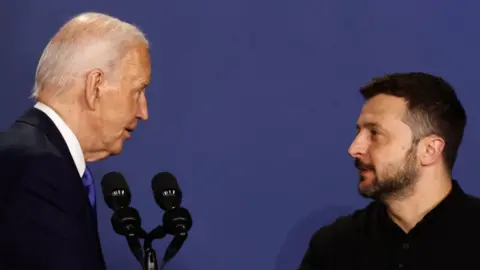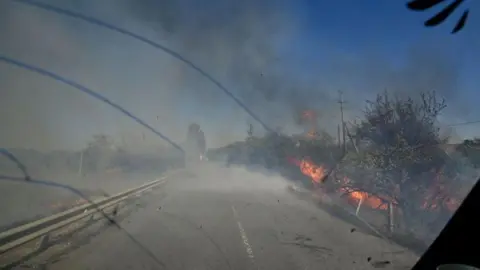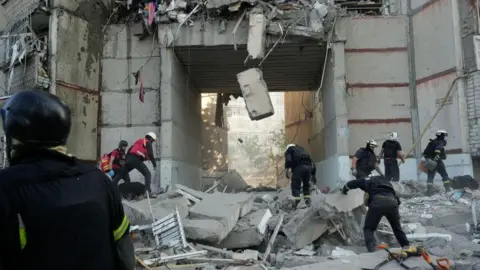Zelensky Counts on Biden to Back Ukraine’s ‘Victory Plan’

 Getty Images
Getty ImagesAs Ukrainian President Volodymyr Zelensky prepares to unveil his “Victory Plan” to President Joe Biden on Thursday, Kyiv is expecting the US leader to show strong support before he leaves the White House.
A senior official in Kyiv said they wanted him to “make history” in his final months in office.
While details of Ukraine’s plan remain secret, the strategy is likely to include calls for additional military and financial support, along with future security guarantees.
Zelensky said it was designed to be a “bridge” towards ending the war, which he believes could end sooner than people think.
He believes that if the West strengthens Ukraine’s position, Russian President Vladimir Putin could be pushed into a diplomatic peace.
Ever shrewd in public relations, the Ukrainian president also wanted to respond to critics in the United States who have questioned the wisdom of pouring more money into Ukraine’s cause – by pushing for a clear plan for eventual peace.
 Getty Images
Getty ImagesZelensky is putting a huge diplomatic effort behind his victory plan.
He’s been virtually camping out at the United Nations. He spoke on Monday at a debate on how the United Nations should be reformed. He spoke at the Security Council on Tuesday. And he’s going to speak at the General Assembly on Wednesday.
During that time, he will meet with world leaders and US politicians. He visited an ammunition factory in Scranton, Joe Biden’s hometown in Pennsylvania, which is producing artillery shells for Ukrainian artillery units.
And he made it clear that he thought time was running out. In one of several interviews with the press, Zelensky told the New Yorker that a plan for victory must be agreed upon — and Ukraine must be consolidated — in October, November and December.
“This plan was designed, first and foremost, with Biden’s support,” he told the magazine. That support is by no means guaranteed, but Zelensky is betting heavily on securing it.
That’s because things would change dramatically if Donald Trump wins. At a campaign rally on Monday, the former president mocked Zelensky as “the greatest salesman in history” because “every time he comes into this country, he leaves with $60 billion.”
Trump reiterated his stance that he would urge Russia and Ukraine to agree to a deal to end the war, a deal that Kyiv fears would force them to accept territorial losses and offer no guarantees against further Russian aggression.
It is the fear of such a scenario that is driving the diplomatic momentum behind Zelensky’s victory plan this week. Some diplomats are skeptical that it will succeed in nudging Russia to the negotiating table. Much depends on Biden’s response.
Congressional lawmakers will be given the plan, as will Trump and his presidential rival Kamala Harris.
Trump has said he would end the war within 24 hours, raising concerns that the Republican candidate would essentially force Kyiv to make territorial concessions against its will.
With the US election approaching, this is a crucial moment for Zelensky as Moscow’s military continues to advance step by step in eastern Ukraine.
A military analyst – Mykhailo Samus, director of the New Geopolitical Research Network, believes that the top priority in the so-called victory plan will be “a strong strike at Russia”.
Giving Kyiv the ability to destroy military infrastructure within a 300km radius could seriously hamper the Kremlin’s offensive operations in Donbas and potentially “neutralise” Ukraine’s ongoing invasion of Russia’s Kursk region, Mr Samus said.
This would mean securing the right to use Western-made long-range missiles against targets deep inside Russia, which has so far been denied.
While Ukraine has successfully deployed drones to attack Russian ammunition depots, missiles can still penetrate more heavily defended ammunition sites.
The plan would also call for more missiles like this, according to Olga Rudenko, editor-in-chief of the Kyiv Independent.
Financial support and further exploitation of Ukraine’s surprise move against Russia’s Kursk region are also expected to form core elements of this strategy.
As for Ukraine’s future security, its aspirations to join the NATO defense military alliance clearly remain.
“Ukraine’s invitation to join NATO is part of the winning plan,” Andriy Yermak, head of the president’s office, confirmed.
 Eugene Hertnier/Suspilne Ukraine/JSC
Eugene Hertnier/Suspilne Ukraine/JSCZelensky’s office has dismissed German reports that he is considering a partial ceasefire as “fake”.
However, Czech President Petr Pavel – a strong supporter of Ukraine – said this week that parts of Ukraine could remain occupied “temporarily”, possibly for years.
Olga Rudenko believes that, for most Ukrainians, making any concessions even temporarily to Russia remains “too sensitive and unthinkable” – even if that conversation were to take place somewhere, privately, within the government.
“It is not that Ukrainians are greedy for territory,” she said.
“We cannot leave our people there, under Russian control, and condemn them to those horrors,” referring to repeated accusations of Russian war crimes.
That view was echoed by Dmytro, 31, who suffered severe burns to his face and arms when he was hit by a Russian drone.
“We will not give up our territory, which so many people died for,” he told the BBC in Kyiv.
“If we end the war at this stage, then what are we fighting for? What did all our men, all our comrades die for?”
He believes a ceasefire would only give Russia time to recover, and Zelensky also warned of a “frozen” conflict.
Dmytro planned to return to the front line to fight with his comrades: “I will not retreat, I will be there until my last breath.”





